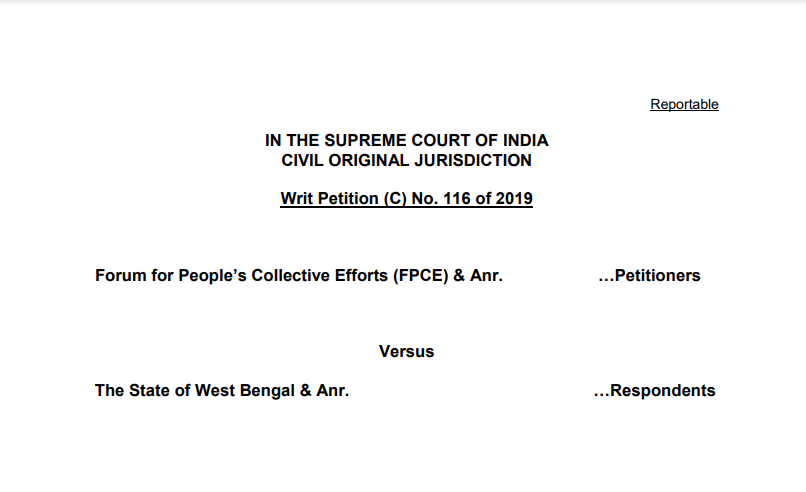Supreme Court in the case of Forum for People’s Collective Efforts (FPCE) Versus The State of West Bengal
Case Covered:
Forum for People’s Collective Efforts (FPCE)
Versus
The State of West Bengal
Facts of the Case:
The constitutional validity of the West Bengal Housing Industry Regulation Act, 2017 (“WB-HIRA”/the “State enactment”) is challenged in a petition under Article 32. The basis of the challenge is that:
(i) Both WB-HIRA and a Parliamentary enactment – the Real Estate (Regulation and Development) Act, 2016 (“RERA”/the “Central enactment”) are relatable to the legislative subjects contained in Entries 6 and 7 of the Concurrent List (interchangeably referred to as ‘List III’) of the Seventh Schedule to the Constitution;
(ii) WB-HIRA has neither been reserved for nor has it received Presidential assent under Article 254(2);
(iii) The State enactment contains certain provisions which are either:
a. Directly inconsistent with the corresponding provisions of the Central enactment; or
b. A virtual replica of the Central enactment; and
(iv) Parliament having legislated on a field covered by the Concurrent List, it is constitutionally impermissible for the State Legislature to enact a law over the same subject matter by setting up parallel legislation. Nuances apart, this, in substance, is the essence of the challenge.
Observations:
Now, in assessing the correctness of the submission, it is necessary to construe Section 88 in its proper perspective. Unless this is done, the Court would be doing violence to the intent of Parliament and to the constitutional principles which are embodied in Article 254. Parliament envisaged in Section 88 of the RERA that its provisions would be in addition to and not in derogation of other laws for the time being in force. True enough, this provision is an indicator of the fact that Parliament has not intended to occupy the whole field so as to preclude altogether the exercise of legislative authority whether under other Central or State enactments. For instance, Section 71 of the RERA specifically contemplates (in the proviso to sub-Section (1)) that a complaint in respect of matters covered by Sections 12, 14, 18 and 19 is pending in the adjudicating fora constituted by the Consumer Protection Act, 1986. The person who has moved the consumer forum may withdraw the complaint and file an application before the adjudicating officer constituted under the RERA. The effect of Section 88 is to ensure that remedies which are available under consumer legislation, including Consumer Protection Act, 2019, are not ousted as a consequence of the operation of the RERA. Of course, it is also material to note that both sets of statutes, namely the Consumer Protection Act(s) and the RERA, have been enacted by the Parliament and both sets of statutes have to be therefore harmoniously construed. Section 88 of the RERA does not exclude recourse to other remedies created by cognate legislation. Where the cognate legislation has been enacted by a State legislature, Section 88 of the RERA is an indicator that Parliament did not wish to oust the legislative power of the State legislature to enact legislation on cognate or allied subjects. In other words, spaces that are left in the RERA can be legislated upon by the State legislature by enacting legislation, so long as it is allied to, incidental, or cognate to the exercise of Parliament’s legislative authority. What the State legislature in the present case has done is not to enact cognate or allied legislation but legislation which, insofar as the statutory overlaps is concerned is identical to and bodily lifted from the Parliamentary law. This plainly implicates the test of repugnancy by setting up a parallel regime under State law. The State legislature has encroached upon the legislative authority of Parliament which has supremacy within the ambit of the subjects falling within the Concurrent List of the Seventh Schedule. The exercise conducted by the State legislature of doing so is plainly unconstitutional.
The Decision of the Court:
For the above reasons, we have come to the conclusion that WB-HIRA is repugnant to the RERA, and is hence unconstitutional. We also hold and declare that as a consequence of the declaration by this Court of the invalidity of the provisions of WB-HIRA, there shall be no revival of the provisions of the WB 1993 Act, since it would stand impliedly repealed upon the enactment of the RERA.
Since its enforcement in the State of West Bengal, the WB-HIRA would have been applied to building projects and implemented by the authorities constituted under the law in the state. In order to avoid uncertainty and disruption in respect of actions taken in the past, recourse to the jurisdiction of this Court under Article 142 is necessary. Hence, in the exercise of the jurisdiction under Article 142, we direct that the striking down of WB-HIRA will not affect the registrations, sanctions, and permissions previously granted under the legislation prior to the date of this judgment
The writ petition is accordingly stand allowed in the above terms.
Pending application(s), if any, stand disposed of.
Read & Download the full Decision in pdf:
If you already have a premium membership, Sign In.
 ConsultEase Administrator
ConsultEase Administrator
Consultant
Faridabad, India
As a Consultease Administrator, I'm responsible for the smooth administration of our portal. Reach out to me in case you need help.













